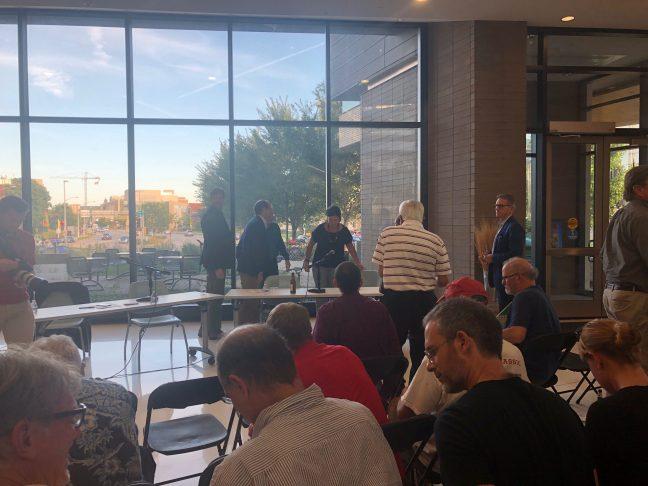The Wisconsin Energy Institute held a panel on innovation in the clean energy marketplace to kick off National Clean Energy Week Monday night.
The panel included Rebecca Cameron Valcq, who was just appointed as the chair of the Public Service Commission of Wisconsin by Gov. Evers, Andrew Held, a University of Wisconsin alumni and the vice president of Virent, a company that makes biofuels, and Gregory Nemet, a UW professor in the La Follette School of Public Affairs and author of “How Solar Energy Became Cheap.”
Valcq began the panel by recalling her days working at the Wisconsin Energy Corporation where she learned about the many aspects of energy — climbing electrical poles and working in a coal-fired power plant. Valcq said this wide range of experience gave her insight into the many functions of energy and its importance in the environmental industry.
“That gave me an appreciation of how energy impacts people every day in a myriad of ways,” Valcq said. “I find this particular point in the energy industry to be so extremely fascinating because there are so many parties that were once divergent or had divergent interests who are now all seated together … and it couldn’t come at a better time.”
Nemet also said the energy industry has reached an important point in time, adding that every semester he has to update a large portion of his course materials to keep up with the rapidly changing industry.
The cost of solar power is a good example of how fast innovation has occurred in the energy industry, according to Nemet, who said solar has fallen in cost more than any other energy technology. Nemet said the way we deliver and regulate energy must catch up to these new changes.
“We’re really, mostly with an electricity provision system that looks similar to the 1930s… and yet we’ve got these new technologies that tend to be smaller,” Nemet said. “Regulations are going to have to somehow adapt.”
One way energy regulations may adapt is through the use of carbon taxes, according to Nemet, who said he believes it is “very likely” the U.S. will have carbon taxes by 2030.
Nemet said people like his daughter, who skipped school last Friday to attend the global climate strike, are not going to stop protesting in the next 10 years. Nemet said it seems reasonable to have taxes of $20 to $40 per ton by 2030.
Valcq said it is unlikely to get to zero carbon in the electricity sector without the use of nuclear. While energy efficiency, wind-powered energy and solar energy will all play a part in reducing carbon, nuclear will also be necessary. Though the cost of building nuclear plants is high now the price may drop with new technologies the way solar costs have.
While looking out over the packed crowd of people in attendance, Valcq said this level of engagement is another way the energy industry is changing.
“Ten years ago we couldn’t get this many people in a room to talk about energy policy … we’re seeing consumers be active participants in the energy industry in a way that I don’t think existed before.”
The panel ended with a reception where UW students were able to present their research to the attendees.


